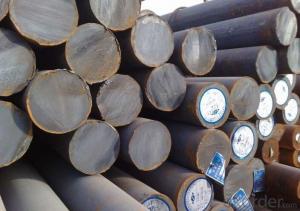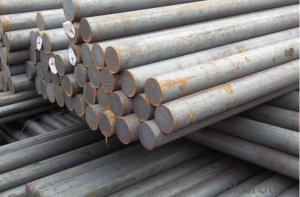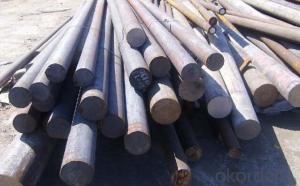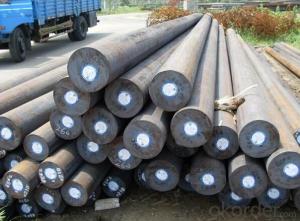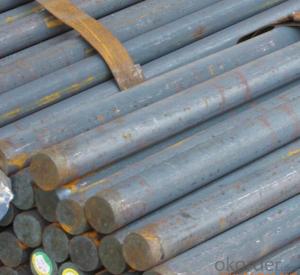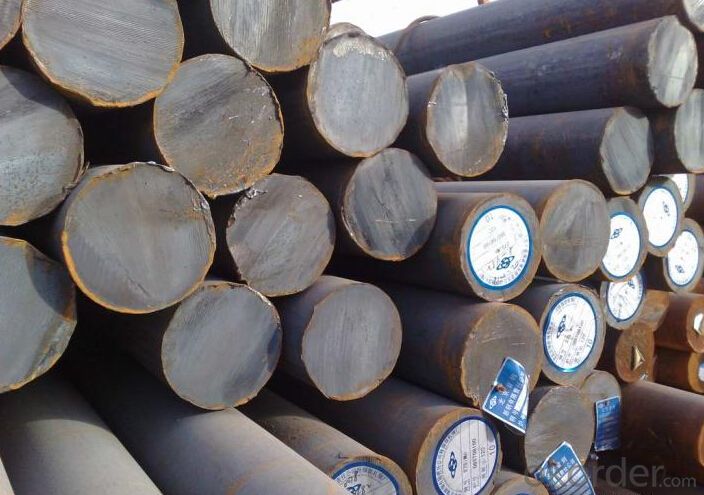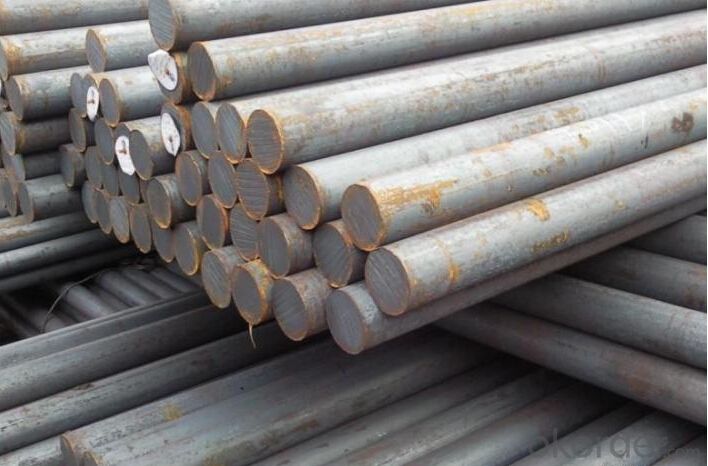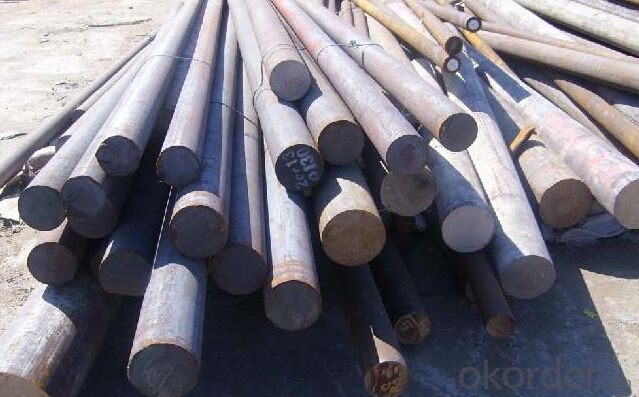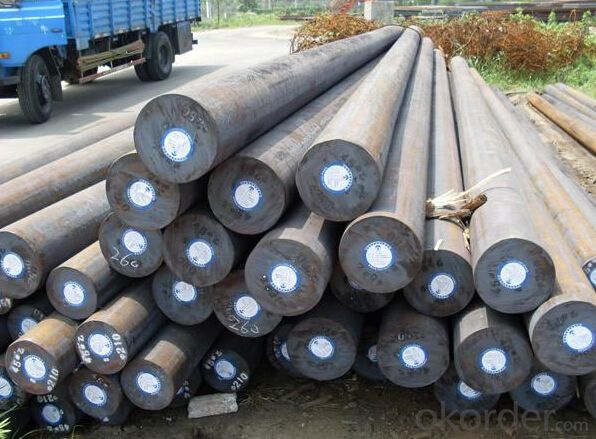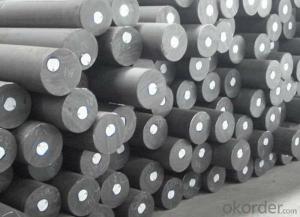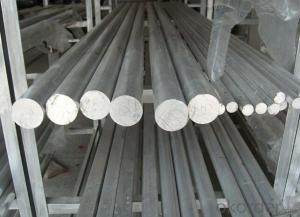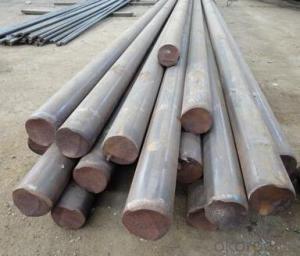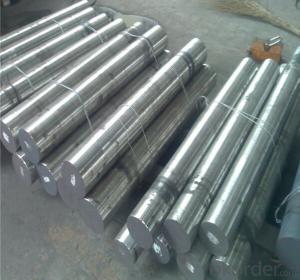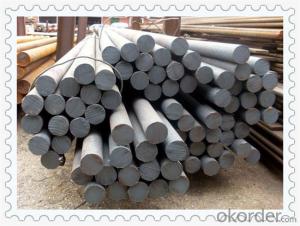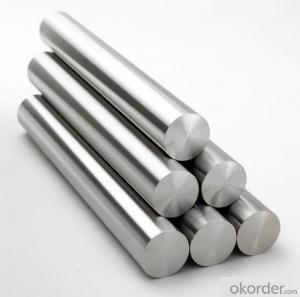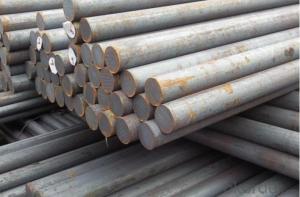SAE1018 steel round bar/ASTM A36 steel equivalent
- Loading Port:
- Tianjin
- Payment Terms:
- TT OR LC
- Min Order Qty:
- 3 m.t.
- Supply Capability:
- 10000 m.t./month
OKorder Service Pledge
OKorder Financial Service
You Might Also Like
Specification
SAE1018 steel round bar/ASTM A36 steel equivalent
Name | Carbon Steel Round Bar |
Shape | Round Bar/Square Bar/Flat Bar/Plate/Wire |
Standard | GB/ASTM/SAE/AISI/DIN/JIS/EN/BS |
Surface Treatment: | Black/Peeling/Polished/Machined |
Delivery Condition: | Hot Rolled or Forged/Peeled or Black Surface |
Test | SGS/UT 100% Elements Testing |
Certificate: | ISO/Mill Certificate |
Service: | 24 hours online service / |
more than 20 years trading and manufacture | |
Quality Assurance: | the third party inspection, such as SGS, BV, TUV…etc. is acceptable |
Packaging Details: | seaworthy packaging or as per customer's packing instruction |
Chemical Composition
Grade | C | Si | Mn | P | S | Cr | Ni | B |
1020 | 0.17-0.23 | 0.17-0.37 | 0.35-0.65 | Max 0.030 | Max 0.030 | Max 0.25 | Max 0.30 | 0.0008-0.0030 |
1045 | 0.42-0.50 | 0.17-0.37 | 0.50-0.80 | Max 0.030 | Max 0.030 | Max 0.25 | Max 0.30 | 0.0008-0.0030 |
Packaging & Delivery
Packaging Detail | Sea worthy packing /as per customer's packing instruction |
Delivery Detail | 15 ~ 40 days after receiving the deposit |
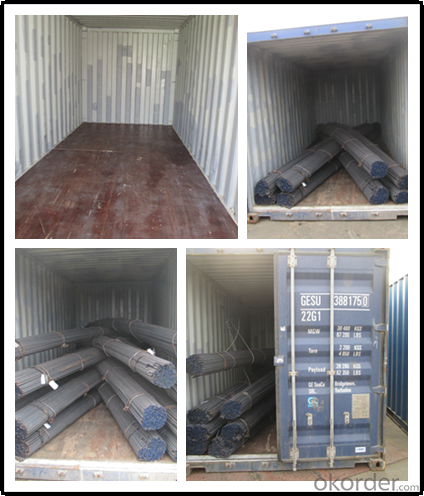
Product Show
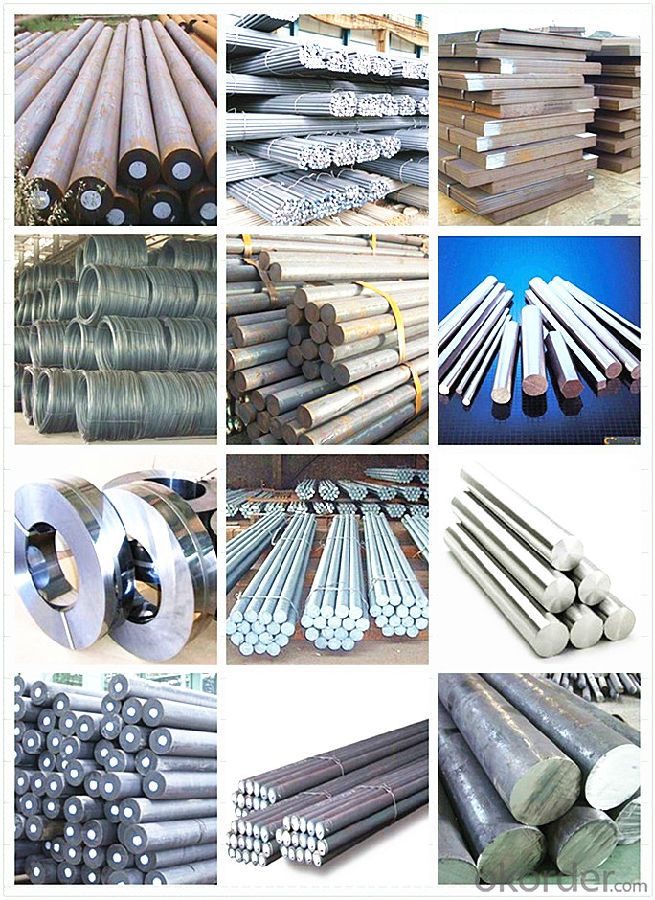
Workshop
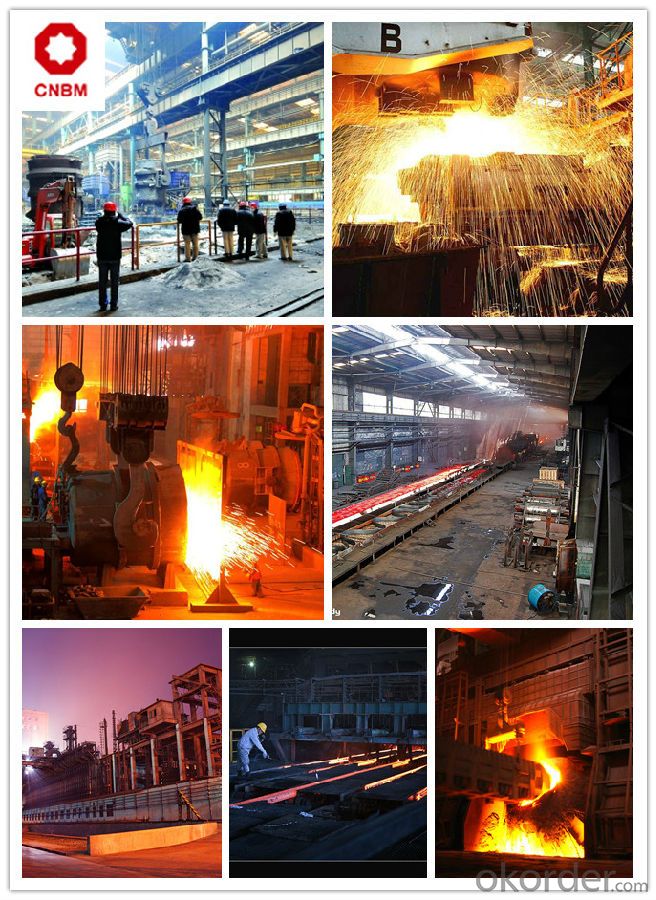
FAQ
Are you a trading company or manufacturer? | Manufacturer |
What’s the MOQ? | 3 metric ton |
What’s your delivery time? | 15-35 days after downpayment received |
Do you Accept OEM service? | Yes |
what’s your delivery terms? | FOB/CFR/CIF |
What's the Payment Terms? | 30% as deposit,70% before shipment by T/T |
Western Union acceptable for small amount. | |
L/C acceptable for large amount. | |
Scrow ,Paybal,Alipay are also ok | |
Why choose us? | Chose happens because of quality, then price, We can give you both. |
Additionally, we can also offer professional products inquiry, products knowledge train (for agents), smooth goods delivery, excellent customer solution proposals. | |
What's your available port of Shipment? | Main Port, China |
What’s your featured services? | Our service formula: good quality+ good price+ good service=customer's trust |
Where are your Market? | Covering more than 160 countries in the world |
- Q: How does special steel perform in cryogenic ductility?
- Special steel performs well in cryogenic ductility. It is able to maintain its flexibility and ability to deform under low temperatures without experiencing brittleness or failure. This makes it suitable for applications in cryogenic environments where materials need to withstand extreme cold temperatures while maintaining their mechanical properties.
- Q: How does special steel contribute to the automotive racing industry?
- The automotive racing industry heavily relies on special steel to ensure the high performance and safety of race cars. With its exceptional properties such as strength, durability, and heat resistance, special steel is the ideal choice for various applications in racing vehicles. One of the primary contributions of special steel to the automotive racing industry lies in its utilization in the construction of engine parts. Crankshafts, camshafts, connecting rods, and valves, which face extreme forces and temperatures during racing, benefit greatly from special steel alloys, particularly high-strength steels. These alloys are specifically engineered to withstand such demanding conditions, providing superior performance compared to conventional steel. As a result, race car engines can operate at higher speeds, generate more power, and endure intense racing conditions without compromising reliability. Moreover, special steel is extensively employed in the production of suspension systems and chassis components. Racing cars experience extreme loads and vibrations while cornering and maneuvering at high speeds. By incorporating high-strength steel into these critical components, the structural integrity of the vehicle is enhanced, leading to improved stability, handling, and overall performance. Aside from its performance advantages, special steel also significantly contributes to the safety of race cars. Safety is paramount in the racing industry, and the use of special steel in roll cages and crash structures provides enhanced protection for drivers in the event of accidents. Special steel alloys, such as boron steel, possess exceptional strength and energy absorption capabilities, thereby minimizing the risk of injuries during crashes. Furthermore, the lightweight nature of special steel allows for the reduction of the overall vehicle weight, resulting in improved fuel efficiency and better handling. Through the utilization of advanced steel materials and design techniques, race car manufacturers can strike a balance between strength and weight, optimizing performance while ensuring safety. In conclusion, special steel plays a vital role in the automotive racing industry by contributing to the performance, safety, and reliability of race cars. Its unique properties enable the development of high-performance engine parts, suspension systems, and chassis components, allowing race cars to withstand extreme conditions and achieve superior performance on the track. Additionally, special steel enhances the safety of race cars by providing robust crash protection, while also offering weight reduction benefits for improved fuel efficiency and handling.
- Q: How does special steel contribute to the automotive noise reduction?
- Special steel contributes to automotive noise reduction in several ways. Firstly, it is durable and strong, allowing for the construction of thinner and lighter components. This reduces the overall weight of the vehicle, resulting in reduced road and engine noise. Additionally, special steel has excellent vibration-damping properties, which helps absorb and minimize noise generated by the engine, suspension, and other moving parts. The use of special steel in the design of automotive structures and panels also helps reduce noise transmission from the outside environment into the cabin, providing a quieter and more comfortable driving experience for passengers.
- Q: What are the advantages of using special steel in construction?
- There are several advantages of using special steel in construction. Firstly, special steel offers superior strength and durability, making it ideal for high-rise buildings and structures that require enhanced structural integrity. Additionally, special steel has excellent corrosion resistance properties, which significantly increases the lifespan of a structure, especially in harsh environments. Furthermore, special steel can be customized and fabricated into various shapes, allowing for flexible and innovative architectural designs. Lastly, special steel is a sustainable and eco-friendly material, as it is recyclable and reduces the need for new resources, thereby contributing to a more sustainable construction industry.
- Q: How does special steel contribute to sustainability?
- There are several ways in which special steel contributes to sustainability. To begin with, special steel possesses a high level of durability and has an extended lifespan. As a result, products created from special steel, such as buildings, bridges, and machinery, enjoy a longer period of service compared to other materials. This reduces the necessity for frequent replacements and repairs, thereby diminishing the consumption of resources and energy needed for manufacturing. In addition, special steel is easily recyclable. When it reaches the end of its life cycle, it can be effortlessly collected and transformed into new steel products without any loss in quality. This diminishes the demand for fresh raw materials and minimizes the environmental impact brought about by mining and extraction processes. Moreover, special steel is renowned for its strength and lightweight characteristics. This enables the design and construction of lighter and more energy-efficient structures and vehicles. For instance, by incorporating special steel into automobiles, the weight of the vehicle can be reduced, leading to lower fuel consumption and greenhouse gas emissions. Furthermore, the production of special steel has become more sustainable over time. Steel manufacturers are embracing advanced technologies and processes to decrease energy consumption, emissions, and waste generation. This encompasses the use of energy-efficient furnaces, the recycling of waste heat, and the implementation of water management strategies. All in all, the utilization of special steel contributes to a more sustainable future by promoting durability, recyclability, energy efficiency, and reduced environmental impact.
- Q: What are the characteristics of high-speed steel?
- High-speed steel is known for its exceptional hardness, wear resistance, and ability to retain its cutting edge even at elevated temperatures. It also possesses good toughness, allowing it to withstand high impact and shock loads. Additionally, high-speed steel has excellent heat resistance, allowing it to maintain its strength and hardness at high operating temperatures.
- Q: How is corrosion-resistant steel used in marine applications?
- Corrosion-resistant steel is extensively used in marine applications due to its ability to withstand the harsh environment of seawater. It is employed in the construction of various marine structures such as ships, offshore platforms, and coastal infrastructure. This type of steel provides exceptional resistance to corrosion, preventing the degradation of materials and ensuring the longevity and safety of marine structures. Additionally, corrosion-resistant steel is used in the production of marine equipment, such as propellers, valves, and pipelines, as it offers superior durability and protection against corrosion caused by saltwater exposure.
- Q: What are the different standards and specifications for special steel?
- There are several standards and specifications for special steel, which vary depending on the specific type and application of the steel. Some common standards include AISI (American Iron and Steel Institute), ASTM (American Society for Testing and Materials), EN (European Norm), and JIS (Japanese Industrial Standards). These standards define the chemical composition, mechanical properties, and manufacturing processes required for special steel to meet certain quality and performance standards. Additionally, there may be specific specifications for different industries or applications, such as aerospace, automotive, or construction, that further define the requirements for special steel.
- Q: What are the common alloys used in special steel?
- Some common alloys used in special steel include stainless steel (which contains chromium and often nickel), tool steel (which contains tungsten, vanadium, and sometimes cobalt), and high-speed steel (which contains tungsten, molybdenum, and sometimes cobalt).
- Q: Can special steel be used in the production of luxury goods?
- Yes, special steel can definitely be used in the production of luxury goods. Luxury goods often require high-quality materials to ensure durability, exclusivity, and overall premium quality. Special steels, such as stainless steel, alloy steel, or carbon steel, offer various desirable properties that make them suitable for luxury goods manufacturing. For instance, stainless steel is widely used in luxury watches, jewelry, and accessories due to its corrosion resistance, shiny appearance, and ability to withstand daily wear and tear. Additionally, certain alloy steels can provide exceptional strength and toughness, making them ideal for luxury car parts, high-end knives, or designer furniture. The use of special steel in luxury goods not only enhances their aesthetic appeal but also contributes to their longevity and value. These materials can be crafted into intricate designs, allowing manufacturers to create unique, one-of-a-kind products that cater to the discerning tastes of luxury consumers. Overall, special steel offers a wide range of qualities that are highly sought after in the production of luxury goods, making it a preferred choice among designers and manufacturers in this industry.
Send your message to us
SAE1018 steel round bar/ASTM A36 steel equivalent
- Loading Port:
- Tianjin
- Payment Terms:
- TT OR LC
- Min Order Qty:
- 3 m.t.
- Supply Capability:
- 10000 m.t./month
OKorder Service Pledge
OKorder Financial Service
Similar products
Hot products
Hot Searches
Related keywords

